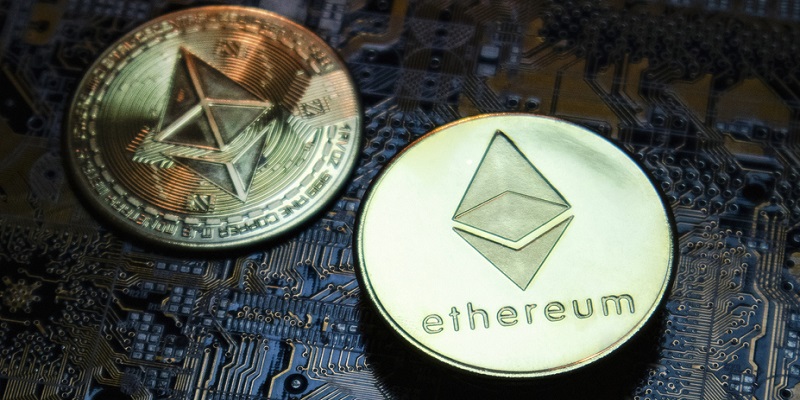Hi, Dan Steinhart here, RiskHedge publisher.
I’m filling in for Stephen McBride today to share a new investing angle with you. One that could let you collect returns between 171.5% and 357.3%.
Normally, it’s silly to project profits down to the precise decimal point. But these are not my estimates…
A sophisticated group of analysts at financial network Bloomberg calculated them.
They reflect the potential gains you could make buying Ethereum (ETH)—the second biggest crypto—at today’s prices.
In short, these analysts did something I’ve almost never seen in mainstream finance before.
They put Ethereum through a valuation analysis. In plain English, they looked at Ethereum’s cash flows to figure out what it’s really worth.
Their low/medium/high estimates are:
$5,539, $6,120, and $9,328.
Keep in mind, Ethereum is currently worth about $2,000.
$5,539, $6,120, and $9,328 are a lot higher than $2,000.
So even in their worst-case scenario, Ethereum will gain about 171% from here.
Best-case scenario, you’d more than quadruple your money.
-
But there’s a far more important side to this story that flew over most heads…
These analysts valued Ethereum using cash flow analysis.
If you don’t yet understand why this is a huge deal… please pay close attention.
Cash flow analysis is the gold standard for determining what a business is worth. That’s because it only cares about one thing: cold hard cash coming into the business. There are armies of Wall Street analysts whose sole job is doing cash flow analyses on stocks.
An analyst simply studies a business and projects how much cash it will generate many years into the future. Then he adds up all this expected cash, makes adjustments for interest rates and timing, and arrives at a number. That number is what the business “should” be worth.
Cash flows don’t care about hype. They don’t care how much money a similar business just raised. They don’t care about cute stories, unprofitable growth, or imaginary future products.
They strip away all that wishy-washiness to answer one question: how much cash will flow my way if I buy into this business?
Simply put, cash flow analysis is grounded in reality in a way that many other valuation methods are not.
-
“Grounded in reality” is not how many people would describe crypto…
No doubt, there’s a lot of hype in crypto. And a lot of high-priced assets seem to get 100% of their value from the imagination of their followers.
That’s why this Bloomberg news is so important.
For the first time, Wall Street is valuing a crypto in a concrete way… like a stock!
The biggest knock on crypto has always been that it doesn’t produce anything. As superinvestor Warren Buffett said in 2019:
“Bitcoin… doesn’t produce anything. You can stare at it all day, and no little bitcoins come out.”
No one in crypto likes to admit this. But Buffett is right about bitcoin (BTC). When you buy shares in Coca-Cola, you’re part-owner of a profitable empire that produces food and drinks for customers—and cash flow for investors.
When you buy bitcoin, you get some lines of code that produce nothing for customers—and no cash for investors.
Said differently, bitcoin fails the cash flow test. It cannot be valued in terms of cash flow because it produces no cash.
-
That’s not the same thing as saying bitcoin is worthless…
Clearly, bitcoin is worth a lot—about $30,000 a coin.
But it’s in a category of assets that don’t produce anything: like oil, gold, soybeans, or the euro. Although these assets don’t generate cash, they’re still valuable because they’re useful. A barrel of oil is worth about $120. An oz of gold is worth about $1,900.
The vast majority of investors (probably close to 99.99%) assume all cryptos fall into this category.
Potentially useful… but impossible to value in any concrete way because they don’t generate cash.
-
Ethereum is a different animal…
If you’ve been reading Stephen’s articles, you roughly understand what Ethereum does.
It’s the foundation on which a new, rapidly-growing financial system is built. In this financial system, you can send and receive money, lend and borrow money, buy and sell cryptos, and make many other financial transactions without touching US dollars or the banking system.
Using this system isn’t free. Users pay a fee for every transaction in Ethereum. These fees contribute to Ethereum’s revenue. Ethereum’s revenue is roughly $16 billion annualized… more than double hotel disruptor Airbnb’s revenue.
Do you see why this is important?
Unlike bitcoin, Ethereum has cash flow. And without going down a rabbit hole… more and more of this cash will be flowing to Ethereum investors as upgrades are made to its network.
In short, you can already collect a 4% “dividend” just for holding Ethereum. The yield is paid daily. And it’s set to roughly double to 8%—possibly as high as 10%—when planned upgrades to its network are completed this year.
-
What do you say, Warren Buffett?
Remember his comment about bitcoin?
“No little bitcoins come out…”
True about bitcoin. False about Ethereum.
In the most literal sense possible, Ethereum does exactly what Buffett correctly accuses bitcoin of not doing. It produces more Ethereum through fees earned on its network.
And if Bloomberg’s calculations are correct… capital gains of at least 171% are likely on Ethereum.
Along with a 4% “dividend” now and an 8%–10% dividend later.
Where else in finance can you get that combo?
Regards,
Dan Steinhart
Publisher, RiskHedge



